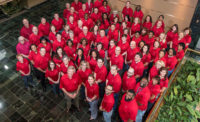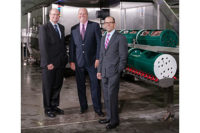Corporate photos by Justin Burks Photography; Martinsville plant photos by Andy Hanacek
In the current economic climate, bottle-rocket success stories pepper the business headlines every day. Some of these companies find the secret to stabilization, but many others quickly fade into the night, either swallowed up by private equity or a larger company and gutted for saleable assets, or pummeled by poor business decisions and missteps forcing a downfall from grace to the “failure” bin.
More than half a decade ago, Monogram Foods was a fast-rising processed-meat and meat-snacks success story based in Memphis, Tenn., making waves in acquiring processing facilities and regional brands, all while building up its private-label and licensed-brands business.
Karl Schledwitz, chairman and CEO, says, “Growth is in our DNA,” and Monogram Foods has continued to prove that mantra true, continuing its buying spree at a steady clip.
However, growth alone doesn’t make Monogram Foods’ story much different from others — companies merge and acquire other companies all the time. What has been remarkable (and what Schledwitz calls “exhilarating”) has been the transformation of these acquisitions into measurable success stories time and time again.
|
Expansion: standard practice Andy Hanacek, editor-in-chief, visited Monogram Foods’ Martinsville, Va., processing facility, which was undergoing a significant expansion during his visit. Hanacek toured the facility and discussed Monogram’s plans for the future with Drew Dodson, vice president of operations, Meat Snacks, for Monogram Foods. What follows is a portion of their conversation:
Hanacek: How has your division been able to contribute to Monogram Foods’ skyrocketing growth over the last decade?
Dodson: One, we make a very good, quality product. All of our plants are BRC plants, so customers can come in and know that their products will be food-safe. We have very much of a “can do” attitude. If you come to us with an idea, we’re going to do our best to figure out how to make it work. So that has really driven a lot of the business. The other thing is, we have done a great job in operations here taking the cost out of the business. So we can offer a lower cost to our customer. Then, if it’s a co-manufactured item we’re processing, we’re in business so that the other people can grow, too. … It’s to our benefit that they grow. That is the mindset of Monogram Foods: We truly want to be partners with each one of our customers.
Hanacek: And this success has led to the plant expansion in your Martinsville, Va., facility, correct?
Dodson: Yes, we are expanding, and not only in Martinsville, but we’ve got some type of expansion going on in every one of our plants. In Chandler and in Texas, we’re creating more production space. Right now, all three of our plants are just kind of busting at the seams in production. Hanacek: What are the details of the Martinsville expansion that is underway out there?
Dodson:It’s a 54,000-square-foot expansion that will produce jerky. We hope to be up and running the middle of June. We will initially add 80 people, but six months to a year after launch, we will be at two full shifts, with about 200 people. … It’s pretty much going to be its own separate plant, from incoming raw material all the way to the end product.
Hanacek: What are some of the areas of the plant where Monogram Foods can take another step forward and advance its process or products?
Dodson: With our internal plan, we’re looking at automating our packaging wherever we can. There are some products that we can’t [automate], but there are some we can easily. Right now, hand-packing our product is just slow, and we can produce more pounds out of this plant if we eliminate bottlenecks. It could be hand-screening or hand-packing, or it could be the ovens, or something else. For example, one of our jerky products is all hand-laid, and we do that because we have to slice and marinate it. We’re looking at a way to be able to inject and slice straight onto a screen, which will eliminate that bottleneck. Then once you get past that, our next bottleneck is going to be the hand-packing. Hanacek: As we toured the plant, you were telling me that the Wild Bill brand of products isn’t something you can’t automate — can you clarify the reasons for that?
Dodson: It is known in the market to be handcrafted and hand-hung, and we have no intentions of going away from that, because it does have a little bit of a cult following. People that know that product know what they’re looking for. I don’t how many times we would get customer complaints [if we didn’t process the product the way we do].
Hanacek: In terms of food safety and worker safety, what kind of things moving forward do you anticipate happening, if anything? Do you have any initiatives in the works or in process that you want to talk about or can talk about?
Dodson: Food safety for us is job one. We are BRC-certified, and this is what’s really awesome. Monogram is a co-manufacturer, and each one of those co-manufacturers has its own audits. … So in 2014, Monogram went through 46 different audits in five plants, and we passed with the highest grade in every one of those audits. We have some of our customers [who have] ramped up their audits, and to get prepared for these audits has made our plant so much better. The food safety is so much better. … [Nevertheless] we are looking at investing into our quality department more. We’ve been increasing our staffing, especially with the expansions. … We’re going to invest in our R&D department a little bit
|
“What we have been able to do with our acquisitions [over the years] is to buy an underutilized facility and successfully build it up and get it fully utilized,” Schledwitz explains. “That’s the difference between making money and losing money — because if we don’t fill them up with profitable business, we’ve bought a lemon.”
Among the “vehicles” added to Monogram’s fleet, lemons have been very rare, and Schledwitz proudly points at the company’s strong corporate culture and structure as the catalyst in making each of these pieces work so well together.
“Culture eats strategy for breakfast,” he says. “[Success] starts with a vision, but after you develop that vision, the culture you install is more important than the strategy, because you have to be nimble and change.
“We have a vision, but installing our culture has been so critical, and it’s been fun as well,” Schledwitz adds. Wes Jackson, president and co-founder (with Schledwitz) of Monogram Foods, adds that the past decade has been the “ride of his life.” Yet despite all the highs, there have been plenty of challenges along the way.
“Initially, we grew the company before we had the infrastructure in place — we didn’t really have a ‘world class’ CFO or an HR department,” Jackson explains. “We had a lot of smart people wearing a lot of different hats, but we all had to act as CFOs, sales, marketing and HR. Today, we’re maybe a senior position or two away from being able to simply bolt on acquisitions without having to add senior staff.”
Through the last 10 years, Monogram Foods has built up a culture through which it makes no secret of its heart and conscience. Jackson says that mission is driven through to everyone Monogram reaches.
“We are a growth company that really cares about our team members and our customers,” he explains. “We’re a different kind of company that really does value our culture — we’re looking for smart, qualified people that have an entrepreneurial spirit but also can fit in culturally.”
Jackson says he and several others at Monogram Foods left their previous jobs because of the corporate bureaucracy that bogged them down in their daily jobs. Monogram Foods offered a family-like atmosphere where everyone works to propel the company forward rather than dwelling on mistakes that may have been made. Schledwitz backs the family-like atmosphere, mentioning how much the company “loves” its employees and comparing the decade of growth at Monogram Foods to raising a child.
“When you are raising a child, you have the opportunity in the early ages to teach principles and instill that culture, instill your ethics,” he says. “Any parent will tell you that if you wait till that child is a teenager to start teaching him or her the difference between right and wrong, it’s too late.”
Of course, that doesn’t mean Monogram Foods’ workforce is on autopilot, simply referencing the mission and values statements for guidance on corporate policies, culture and ethics. Quite the contrary, in fact.
“When you stop learning, you stop growing,” Schledwitz says. “It’s a continuous process, and as often as companies say that it’s all about their people, you cannot forget that lesson.”
The process and culture have worked, to the tune of Monogram Foods surpassing the 2,000-employee mark sometime in 2015, once this year’s plant expansions are fully staffed. Jackson says the company is getting large enough that it could “fall into the trap of creating a similar bureaucracy to the ones we were trying to get away from” when Monogram Foods was founded, but he believes that the culture is strong enough to thwart that.
From a timeline perspective, it has been a short, swift shot upward for Monogram Foods — early on, the company addressed concerns that it could grow too quickly to manage all the added manpower, facilities and brands.
“When we first started, we had maybe 15 employees and $8 million worth of revenue,” Jackson says. “I can’t tell you that I closed my eyes andsaw us 10 years down the road being near $500 million in revenue and a couple thousand employees. But I did close my eyes and dream that we’d have created something special and being successful at it.”
Now, with all that acquisition experience under its belt and a year of expansion within the company’s own facilities, Jackson adds that Monogram has no plans to slow down. Furthermore, after the first few years of spreading itself across a couple food and beverage categories — including an early foray into coffee processing — the Monogram executive team has learned to target acquisitions that fit their processing capabilities. Jackson says that the company’s current list of potential candidates “make sense in that there’s some strategic alignment and they’d be easy to bolt on.”
“But you need a goal, especially to get shareholder alignment,” he adds. “So we have our ‘Sixty in Six’ target of $60 million worth of EBITDA in six years — by the end of 2017, we need to attain that, and we’re focused on it.”
As it stands, Monogram Foods is on pace to meet or exceed that goal. But the company won’t reach the goal based strictly on organic growth. It will need one or two acquisitions to get there, meaning Monogram’s “breather” out of the M&A headlines can’t last very long.
Schledwitz acknowledges that “there are a lot of opportunities,” with acquisitions almost certain in the near future.
“In fact, I hope anyone reading this article that has an underutilized facility they’re looking to sell would contact us,” he concludes with the perfect wry smile.
With that type of hunter’s mentality, it won’t be long before Monogram Foods takes another step forward — bringing it closer to reaching its “Sixty in Six” goal and reaffirming it as a role model that all meat- and poultry-processing startups should study and emulate.









Report Abusive Comment